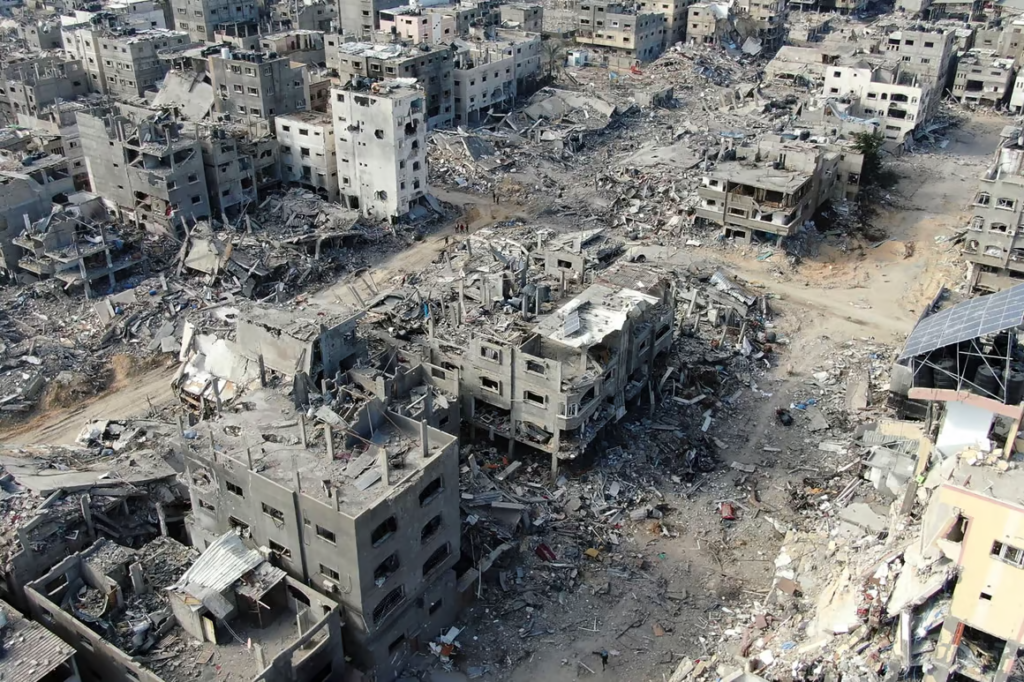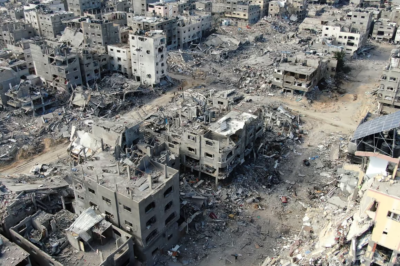
Israeli airstrikes on Gaza have killed at least 15 people, adding to the ongoing death toll as violence in the region continues to escalate. The strikes targeted Hamas positions in Gaza, and the situation has drawn sharp reactions from the international community. In response to the growing tensions and loss of life, Egypt has initiated fresh talks with Hamas in Cairo, seeking to mediate between the two sides and prevent further bloodshed.
The Gaza Strip, which has long been a flashpoint for Israeli-Palestinian tensions, has been under heavy bombardment by Israeli forces since the start of the latest escalation. Hamas, the militant group that governs Gaza, has retaliated with rocket fire into Israeli territory, further intensifying the conflict. The Israeli government claims its strikes are targeting Hamas military infrastructure and operatives, while humanitarian organizations have expressed concerns about the impact of these strikes on civilians.
This recent flare-up in violence has added to the already dire situation in Gaza, where thousands of people have been killed in the ongoing conflict. The strikes have also drawn condemnation from various international actors, calling for an end to the violence and a return to negotiations.
The Gaza Conflict: A Historical Context – The Gaza Strip has been a center of conflict between Israelis and Palestinians for decades. The area is home to over two million Palestinians and is controlled by Hamas, a militant group that has been in power since 2007. Hamas is considered a terrorist organization by Israel, the United States, and the European Union due to its attacks on Israeli civilians and its stated goal of the destruction of the Israeli state.
Since its rise to power, Hamas has clashed repeatedly with Israel, engaging in a series of military confrontations that have resulted in heavy casualties on both sides. The most significant escalations have occurred in 2008, 2012, 2014, and most recently in 2021, with periodic flare-ups of violence in between. The ongoing cycle of violence has left Gaza in a state of near-permanent humanitarian crisis, with limited access to basic services like healthcare, clean water, and electricity.
The Israeli Perspective on the Strikes – Israel’s government has long maintained that its military actions in Gaza are a response to Hamas’ rocket attacks and other acts of aggression. The Israeli Defense Forces (IDF) assert that they are targeting military infrastructure used by Hamas to launch rockets into Israeli cities and towns. Israel also claims that its strikes are intended to protect its civilian population from Hamas and other militant groups operating in Gaza.
The IDF has used airstrikes, artillery, and ground forces to target Hamas leaders and military positions, including weapons caches and tunnels used by militants to move across the region. Israel has stated that it takes extensive measures to avoid civilian casualties, but the densely populated nature of Gaza makes such efforts difficult.
However, critics argue that the Israeli strikes are disproportionate and have caused excessive harm to civilians. Human rights organizations have pointed to the high number of civilian deaths and the destruction of civilian infrastructure, such as homes, schools, and hospitals, as evidence of indiscriminate bombing. International bodies, including the United Nations, have repeatedly called for an end to the violence and urged Israel to respect international law and human rights standards.
The Role of Hamas in the Conflict – Hamas has been at the center of the conflict between Israelis and Palestinians since its founding in the late 1980s. The group emerged from the Palestinian branch of the Muslim Brotherhood, and its leaders espoused an Islamist ideology that calls for the establishment of an Islamic state in historic Palestine, which includes the territory currently occupied by Israel. Hamas does not recognize the legitimacy of the Israeli state and has used violence, including suicide bombings and rocket attacks, in its efforts to destroy Israel.
Hamas controls the Gaza Strip, where it has established a de facto government. The group has been responsible for a wide range of militant activities, including attacks on Israeli civilians, the use of human shields, and the development of weapons intended to target Israeli cities. Hamas also operates a network of tunnels beneath Gaza, which it uses to move fighters and supplies, often launching attacks from civilian areas.
While Hamas is considered a terrorist organization by Israel and many Western nations, it enjoys significant support from some segments of the Palestinian population, particularly in Gaza. The group has also received backing from regional powers such as Iran and Hezbollah, which share Hamas’ anti-Israel stance.
The Egyptian Mediation Effort – Amid the ongoing violence, Egypt has taken on the role of mediator in the Israeli-Palestinian conflict, particularly in its efforts to engage with Hamas. Cairo has long been involved in facilitating negotiations between Israel and Hamas, largely due to its proximity to Gaza and its strategic interest in maintaining stability in the region.
Egyptian officials have been in discussions with Hamas in an effort to broker a ceasefire and prevent further escalation. These talks, held in Cairo, are part of broader efforts by Egypt to exert its influence in the region and play a more active role in shaping Middle Eastern geopolitics. Egypt has often served as an intermediary between Hamas and Israel, organizing ceasefire agreements and humanitarian aid convoys to Gaza.
The talks in Cairo are reportedly focused on securing a temporary truce and addressing humanitarian concerns in Gaza. Egypt is also working to push for a broader political solution that would address the underlying issues of the Israeli-Palestinian conflict, including the status of Jerusalem, the right of return for Palestinian refugees, and the future of Gaza and the West Bank.
International Reactions to the Violence – The latest escalation of violence has drawn widespread condemnation from the international community. The United Nations, the European Union, and several countries, including the United States, have expressed concern over the growing number of civilian casualties and the destruction of civilian infrastructure. The UN has called for an immediate ceasefire and an end to hostilities, urging both Israel and Hamas to adhere to international humanitarian law.
The United States, traditionally a strong ally of Israel, has expressed support for Israel’s right to defend itself against Hamas attacks. However, the Biden administration has also called for restraint in the use of force and has urged both sides to de-escalate the situation. The US has also expressed concern over the humanitarian situation in Gaza and has pledged to provide aid to those affected by the violence.
The European Union, while supportive of Israel’s security concerns, has been more vocal in its criticism of Israel’s military tactics and the disproportionate impact on Palestinian civilians. The EU has called for an independent investigation into potential human rights violations committed during the conflict.
In contrast, countries such as Iran, Turkey, and Qatar have expressed strong support for Hamas, condemning Israeli actions as violations of international law and calling for an end to the siege of Gaza. These nations have pledged financial and humanitarian support to Gaza and have advocated for more robust international action against Israeli military operations.
The Humanitarian Crisis in Gaza – The ongoing conflict in Gaza has resulted in a dire humanitarian situation. The Gaza Strip, already one of the most densely populated and impoverished areas in the world, has seen widespread destruction as a result of Israeli airstrikes. Buildings, roads, and essential infrastructure have been damaged or destroyed, and there are widespread shortages of food, clean water, and medical supplies.
The healthcare system in Gaza is overwhelmed, with hospitals and clinics struggling to cope with the influx of casualties. Many medical facilities have been hit by Israeli airstrikes, and the lack of adequate medical supplies has made it difficult to treat the wounded. The United Nations has warned of a potential health crisis, as the conflict has disrupted essential services and caused a surge in mental health problems among the population.
In addition to the physical destruction, the conflict has created a sense of deep psychological trauma for the people of Gaza. Years of blockade, conflict, and uncertainty have taken a toll on the population, particularly children and young adults, who have grown up in an environment of violence and instability.
The Road Ahead: Prospects for Peace – As of now, the prospects for a lasting peace agreement between Israel and Hamas appear bleak. The two sides remain deeply divided on key issues, such as the status of Jerusalem, the right of return for Palestinian refugees, and the establishment of a Palestinian state. The failure of previous peace efforts, including the Oslo Accords and the Trump administration’s peace plan, has led many to conclude that a two-state solution is increasingly unlikely.
However, the ongoing violence has made clear the need for a political resolution. The toll on civilians, the destruction of infrastructure, and the deepening humanitarian crisis in Gaza all point to the urgency of finding a lasting peace. Egypt’s efforts to mediate a ceasefire and push for a broader political solution are a step in the right direction, but the road to peace remains fraught with challenges.
Ultimately, achieving a lasting peace will require both Israel and Hamas to make significant concessions and address the underlying political issues that fuel the conflict. The international community must play a more active role in facilitating dialogue, ensuring humanitarian assistance, and holding both sides accountable for violations of international law.









































Leave a Reply